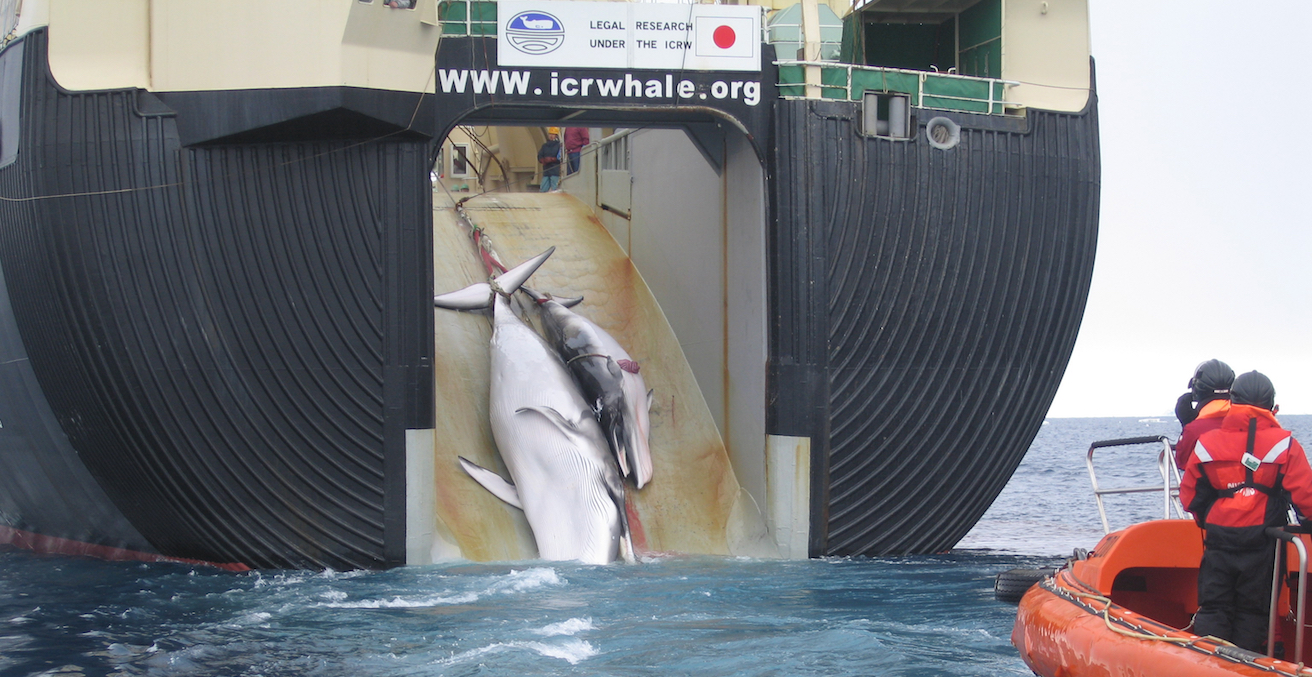How Philosophy Can Help Break the International Whaling Deadlock

This year, Sea Shepherd will not follow the Japanese whaling fleet into the Southern Ocean for the first summer since 2005, but philosophy may provide a pathway to resolving the whaling dispute using international law.
When philosophers have looked at the topic of whaling, they have confined their attention to a fairly narrow set of ethical questions, such as whether international law should permit certain forms of traditional indigenous whaling or extend legal rights to whales themselves. However, there is another important issue which has so far been largely neglected by philosophy, even though it is at the forefront of current international legal disputes over the status of whaling: the issue of so-called ‘scientific whaling’.
It can be looked at by consideration of the international legal dispute between Australia, New Zealand and Japan over the latter’s lethal harvesting of whales in the Southern Ocean, and the recent attempt at resolution by the International Court of Justice (ICJ). On its face, this required that the ICJ demarcate ‘scientific’ from ‘unscientific’ activity; however, it effectively baulked at this task. This approach of the court was unfortunate, and demarcating science from commerce is not only achievable in philosophy, but it might also inform international legal practice.
Questions about the nature and character of scientific knowledge, like other bodies of knowledge, originate in philosophy, but they should not be relegated to that field. Indeed, the ICJ whaling case shows just how important these questions about the nature and character of science are to international law, relations and governance, particularly in highly contested areas such as the global commons of the high seas.
Contemporary philosophy of science provides a substantive and workable understanding of the scope and limits of ‘scientific research’, and the ways in which it can be clearly, transparently and predictably separated from other activities such as commercial exploitation. Had the ICJ applied such a philosophical lens, we may not have returned to the legal-diplomatic dispute over Japan’s new program, because states would have a legal mechanism to evaluate the veracity of claims that a particular whaling program is directed to the pursuit of scientific knowledge.
Indeed, such a lens might have provided much better guidance about the appropriate use of science in other international legal regimes. This, in itself, provides a motivation for greater interdisciplinary engagement between philosophers, lawyers and international affairs experts in working on the governance of the global commons.
The whaling case was predominantly a contest about the meaning or interpretation of the words ‘scientific research’ in Article VIII of the whaling convention. On the one hand, Japan claimed that the countries behind the 1982 commercial moratorium on whaling were motivated by the ethical and social politics of their domestic populations, rather than scientific evidence of the overfishing of whales or threats to the whale population. On the other hand, Australia and other anti-whaling states argued that Japan’s so-called ‘scientific research’ was merely the commercial harvesting of whales dressed up in the laboratory coat of science.
While ‘scientific’ and ‘research’ are compound conceptions, all parties were primarily concerned with the meaning of ‘scientific’ as the operative term which would demarcate permissible from non-permissible types of whaling activity. Specifically, the parties disagreed about how to distinguish between scientific and non-scientific activities involving the killing of whales. The history of the International Whaling Commission (IWC) is, to a great extent, a history of debate over the issue of how to distinguish ostensibly ‘scientific’ whaling from commercial whaling.
One of the earliest disputes concerned whether testing new harpoons on whales could be treated as scientific whaling and, as such, be exempted from the operation of the convention under Article VIII of the whaling convention. In response to disputes of this sort, in 1957 the US delegation to the IWC sought to narrow the interpretation of ‘scientific research’ for the purposes of Article VIII, arguing that at the time of preparation of the Articles of the Convention the framers has envisaged that scientific research was essentially biological research.
Whatever may be the merits of this claim, or the merits of focusing on the original intent of states as a theory of interpretation in international law, the IWC has not been able to resolve or clarify this issue internally. Its own scientific committee has explicitly refrained from offering a “practical definition of science” in the context of Article VIII, saying that “it would be very difficult to make any such definition or to draw a line between one branch of science and another” (IWC, Scientific Committee Report, 1957).
It seems that members of the IWC Scientific Committee were not merely baulking at a difficult task. Rather, they had a principled objection to it. Committee-member Neil Mackintosh explained the committee’s position by saying: “we felt that it would be anti-scientific to make any limit on scientific research of any kind” (Transcript of IWC Scientific Committee Recommendations 1957). This attitude is itself thoroughly anti-scientific. If it is wrong to place limits on scientific research by defining it, then what is to prevent activities such as astrology or tarot card reading from claiming the status of scientific research?
Fortunately, it is not necessary to have a complete definition of scientific research, in the form of necessary and sufficient conditions, to make progress on the whaling dispute between Australia and Japan. The whaling convention really only envisions two types of activity relating to whales: commercial whaling and scientific whaling; and, to a lesser extent, indigenous hunting (which was not a subject of the dispute). Thus, a resolution of the dispute merely requires that we find ways to demarcate scientific research from commercial activity.
Defining science is a notoriously difficult task, and it is understandable that the ICJ was reluctant to weigh into this issue. However, it was an essential feature of the dispute before it and, ultimately, the source of the paralysis in the treaty regime designed to regulate commercial whaling. The ICJ was called in to break the deadlock specifically because the question is hard. That said, the question itself is not unanswerable, or the dispute irreconcilable.
The task of demarcating science from commerce is achievable and can inform international legal practice. It is also absolutely essential if any progress over the current dispute over scientific whaling is to be made. Whilst the ICJ did not need to adopt verbatim all of Australia’s expert’s criteria for science—certainly some are more compelling than others—it was inadvisable for it to accept Japan’s expert view that there is no hope of articulating any criteria at all. Such ontological nihilism means that international laws that rely on science have no meaningful basis, no clarity and no potential to bind the states that are parties to them, because scientific research can mean whatever those states want it to mean.
It could be said that whatever the motivations of the individuals involved, scientific, as opposed to commercial, whaling is whaling that can be justified entirely by reference to the value of acquiring and disseminating truths about cetology, and perhaps marine biology and ocean science more broadly.
This criteria suggests that both of Japan’s whaling programs that were the subject of the dispute—JARPA and JARPA II—were commercial, rather than scientific, whaling programs and, as such, were impermissible under international law. Ultimately, the analysis shows that the ICJ —and perhaps international law more generally—must have a much greater engagement with the philosophy of science.
Dr David Coady is a senior lecturer in philosophy and gender studies at the University of Tasmania.
Dr Brendan Gogarty is a lecturer in law at the University of Tasmania.
Dr Jeffrey McGee is a senior lecturer in climate change, marine and Antarctic law at the University of Tasmania.
This article is an edited extract from an article published in the Australian Journal of International Affairs on 2 July 2017. It may be accessed in its unabridged form here.





